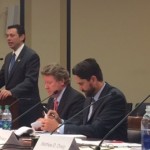From USCIRF. July 8, 2016
“These deeply flawed anti-terrorism measures will buttress the Russian government’s war against human rights and religious freedom,” said USCIRF Chair Thomas J. Reese, S.J. “They will make it easier for Russian authorities to repress religious communities, stifle peaceful dissent, and detain and imprison people. Neither these measures nor the currently existing anti-extremism law meet international human rights and religious freedom standards.”
…
The Russian government uses its current anti-extremism law to target religious communities because the legal definition of extremism does not require the threat or use of violence. “Extremism” charges can include the peaceful promotion of “the superiority of one’s own religion,” and have resulted in religious texts being banned and members of non-violent Muslims groups and Jehovah’s Witnesses imprisoned. The proposed anti-terrorism measures would increase prison terms under the current extremism law.



